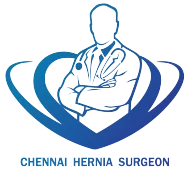This past decade has seen major advancements in technological innovations, and one of the fields that have benefited the most from them is the medical sector.
Diagnosis and surgeries have been made much easier with robot-assisted procedures. Robotic surgeries allow surgeons to operate with greater precision and can also help speed up the recovery process..
These robots are also used in performing hernia surgeries. In this article, we’ll discuss robotic hernia repair in detail: what it is, its benefits, risks, and side effects.
Table of Contents
ToggleWhat is Robotic Hernia Surgery?
As the name suggests, a robotic hernia surgery is performed with the assistance of a robot. This technique has been very useful in performing incisions or sutures and helps with a quicker recovery.
Robotic hernia surgery can be used to treat various types of hernias, including:
- Abdominal hernias (inguinal, umbilical, and femoral hernias),
- Incisional hernias, and
- Hiatal or diaphragmatic hernias.
Robotic hernia repair has especially been helpful in performing complicated hernia surgeries like multiple hernias, weak abdominal muscles, big hernias, etc. This method ensures surgeons can perform precise and accurate surgery with smaller incisions, less pain, and quicker recovery.
How is robotic hernia surgery performed?
Contrary to an open hernia surgery, which involves making a single large incision (cut), robotic surgery is conducted by making small cuts near the hernia site.
The hernia surgeon will be at the console and will be operating the instrument from there. The robot has a tiny scope with a camera and mechanical hands that are used to view and operate the hernia.
The camera provides a 3-dimensional view of the abdomen, and the arms repair the hernia by placing the herniated organ back in its place. It also helps reconstruct and close the weak abdominal wall, ensuring the hernia won’t reappear again.
How long does robotic hernia repair surgery take?
There is no specific time taken to complete one robotic hernia surgery. The duration depends on the size of your hernia and the complexity of the surgery.
Some robotic hernia surgeries can be done in about 30 minutes, while more complicated surgeries may take up to five hours or more.
Benefits of Robotic hernia surgery
A robotic hernia repair surgery has comparatively fewer complications than an open surgery or a laparoscopic surgery. However, it is a surgery at the end of the day, and it inevitably has some risks associated with it.
Some risks of a robotic hernia surgery are
- Bleeding,
- Pain during sexual intercourse,
- Seromas (buildup of fluids under the surface of the skin),
- Hematomas (collection of blood under the skin),
- Possible infections at the surgery site,
- Possible injury to the tissues or organs near the surgery site,
- Problems with urination.
Conclusion
Robotic hernia instruments have helped many patients undergo hernia surgeries with less pain and quicker recovery rates. It is an effective alternative to open and laparoscopic surgeries and Herniotomy Surgeries.
Soon After the Surgery, it is important to note that the food you eat, the clothes you wear, and the travel you do after the Hernia Surgery. so your daily activities influence your healing and recovery rate.
If you are preparing for a hernia surgery, discuss it with your surgeon and understand the entire process before starting it.
Dr. K. Amilthan MBBS., MS., FMAS., FALS.
Heal Your Hernia Now:
- 15+ Years of Experience
- 3,000+ Surgeries
Your Journey to Wellness Begins with us.
FAQ's
- Abdominal hernias (inguinal, umbilical, and femoral hernias),
- Incisional hernias, and
- Hiatal or diaphragmatic hernias.
The main difference between these two types of surgery is that while one is done with the assistance of a robot, the other is done by a laparoscopic surgeon. A robotic hernia surgery is also more efficient and precise than laparoscopic surgeries.
- Bleeding,
- Pain during sexual intercourse,
- Seromas (buildup of fluids under the surface of the skin),
- Hematomas (collection of blood under the skin),
- Possible injury or infections at the surgery site,
- Problems with urination.

Dr. Amilthan
Dr. Amilthan is a renowned laparoscopic hernia surgeon based in Chennai, with over 15+ years of experience in general surgery. He completed his MBBS and MS in General Surgery at Kilpauk Medical College and Government Royapettah Hospital in Chennai.
- All Posts
- Hernia Blog

Which Doctor should you consult for Hernia? You can Consult a general surgeon or a hernia specialist for evaluation and...

A hernia occurs when an organ or any other part of your body pushes through the muscle and surrounding tissue...

An inguinal hernia occurs when the organs push through and bulge against the weak muscles of the abdomen. An effective...

